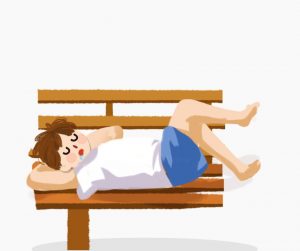How To Stop Sleeping in Class: At first, pulling an all-nighter may appear heroic. But the reality shows up when the adrenaline wears off in the morning and you start to feel shaky on your feet.
Many students, regardless of age, fall asleep in class on a regular basis. Late-night study sessions, a lengthy work shift, a boring teacher, or even a warm classroom might quickly put you to sleep.
There’s no reason to feel bad about falling asleep in class. It’s a natural occurrence.

People can only focus on anything for a maximum of 10 minutes, according to studies. However, given that most sessions take longer than ten minutes and that many professors either ignore or are entirely oblivious of the learning process, it is reasonable to expect students to fall asleep in class after a night’s sleep. Sleeping in class, on the other hand, has repercussions. Because you won’t be able to keep up with the class, your academic performance may drop.
Fortunately, you may use a few ways to stay attentive and engaged throughout the day and avoid falling asleep in class.
This article will cover simple techniques to keep active and attentive in class, as well as why students may fall asleep.
Recommended: How to study for long without getting tired
Top 11 Tips To Stay Awake In The Classroom
1. Get Some Rest The Night Before Your Class: Students who fall asleep in class on a regular basis did not get enough sleep the night before. When it comes to staying away from class, getting enough sleep is the first line of defense. If you have a lecture or class the next day, make sure you get some rest.

In order to get through the day, the typical individual needs eight hours of sleep, but your body may require more.
Maintaining a consistent sleep habit, such as going to bed and getting up at the same time every night, educates your body to identify when it’s time to sleep and when it’s time to get up. Getting enough decent sleep will help you feel less tired during the day
2. Take A Shower Prior To Class: Showering revitalizes and enhances the senses. The hot water in your shower helps to elevate your body temperature. This also increases your heart rate and circulation, allowing your blood to flow more freely throughout your body. Finally, it helps carry oxygen to your vital organs, allowing your body to function at its best.
For an extra boost of vigor, end your shower with a spray of cold water. Your arteries and veins constrict when you are exposed to cold water, allowing blood to flow at greater pressure and improving circulation. By startling your body and forcing you to breathe deeply, the cold water will also help you wake up. This will increase your oxygen intake, making you more mentally alert.
Recommended: Countries with the Best Education System in the world 2022
3. Before Class, Avoid Eating Heavy Meals: This causes you to feel heavy and depletes your vitality. This happens because after eating, the body produces molecules that signify tiredness. This is especially true if you consume specific meals, such as a high-carbohydrate lunch.
Carbohydrates cause the brain to release more serotonin, which makes you feel happy. However, too much serotonin might cause sleepiness by increasing melatonin synthesis. In other words, not all foods have the same effect on your body. Some meals might make you feel energized, while others can make you tired.
It’s also very tasking to compel your body to digest a heavy meal. Large quantities of food, especially unhealthy ones, will deplete your body’s energy reserves. If you consume smaller meals more frequently, you can maintain a consistent level of energy. This allows your body to digest smaller portions of food more often. You will feel invigorated rather than fatigued.
4. Takedown Notes: Take notes as the class is going on to keep your attention on what’s going on in class. Taking notes in class is a good method to remain alert. It requires you to keep your mind active. If you write down what is spoken in class, your brain will be engaged.
Taking notes might also assist you in thinking more deeply and paying attention to the lesson. Your notes don’t have to be excellent; simply jot down the major aspects that interest you and any queries that come to mind. You may take notes in a variety of ways; all you have to experiment to discover the one that works best for you and keeps you focused.

Recommended: Countries With The Highest Job Opportunities
5. Take A Seat In The Front Row: You can get more interested in the lecture by sitting in the front row. Sitting in the front of the class, just like taking notes, will keep you focused on what the teacher is saying. And less on your tiredness.
You’ll also be worried about being chastised by your instructor if you fall asleep, so you’ll want to keep your eyes open.
When you sit at the front, it’s also simpler to pay attention and engage in class. You’ll most likely be seated next to students who are actively engaged in class. Hearing their voices may assist you in staying awake.
6. Avoid Warm Environment: Feeling warmth induces sleepiness. Your body normally expends energy to maintain a steady temperature, but it must work more to keep you cool when you get heated. This necessitates an increase in your heart rate and metabolic rate, which may exhaust you.
Furthermore, warmth is typically associated with comfort, and comfort is associated with sleep. This psychological link is stronger than one may think.
Recommended: Countries with the Smartest Kids in the World
7. Maintain A Regular Sleep Routine: Following a consistent bedtime and wake-up plan is one of the keys to having a decent night’s sleep and, as a result, reduced daytime tiredness. You may train your body’s natural clock to recognize when it’s time to sleep and when it’s time to be up and learn by going to bed and getting up at around the same time every day.
Aim for 7 to 8 hours of sleep each night, however, you may require as much as 9 or 10 hours if you’re in your teens or 20s.
8. Take A Little Stroll: Take a break from class to use the restroom. The little stroll will help you remain awake, not only because it will get you up and moving, but also because the change in surroundings will keep your brain engaged for a few minutes.
Physical exercise informs your brain that it is not yet time to sleep. To boost your perception of alertness, get your blood flowing. Sitting in one spot for an extended period of time reduces circulation and has a bad effect on your mood.
Before heading to class, you can also engage in some physical exercise as a prophylactic precaution. To raise your heart rate and give you some energy, use the stairs instead of the elevator to class.
Also see: Most profitable skills to learn in 2022
9. Stretch: Stretching boosts your energy by resetting your neural system and increasing blood flow. If you can’t get up and move about throughout class, stretching is extremely beneficial. In your seat, you may always perform some easy stretches.
Stretching helps you breathe deeper and awakens your energy reserves, allowing your body to give more oxygen to your important organs.
10. Deepen Your Breathing: Deep breathing, which increases blood oxygen levels, is another strategy to remain alert in class. This decreases your blood pressure and enhances circulation.
Recommended: How to be a good conversationalist
11. Chew Gum: According to research, keeping your lips occupied keeps your mind active. Chewing gum can help you alleviate sleep better. Why? Because it stimulates certain brain areas. So, the next time you’re in class and want to fall asleep, take a stick of gum.
Why Does One Fall Asleep In Class
There are various factors at play when you feel like falling asleep in class. When you’re awake and when your body needs to sleep is controlled by your internal body clock.
Adenosine has a role as well. Your adenosine level rises when you are awake and continues to climb the longer you are awake. The increase in adenosine levels signals a change in sleep behavior. Your body begins to break down adenosine when you go asleep.
When you don’t get enough sleep, you build a sleep debt. You may find yourself falling asleep in class if your sleep debt grows too large.

- Tips to Avoid Sleeping in Class
Recommended: Countries with the best education system in Africa
Why Is Getting Adequate Sleep So Important
Sleep provides our bodies with the rest they require to prepare for the next day. Our bodies require a lot of sleep to be able to rejuvenate and restore the body, for muscle development, for tissue repair, and to generate hormones.
Sleep also allows our brains to process information. The brain sorts and retains information solves problems and replenishes chemicals during this time.
Also see: Differences Between Interpersonal and intrapersonal communication
Conclusion
We’ve found out that the average attention span is 10 minutes. Most class lectures, on the other hand, last far longer. It’s natural to feel drowsy in seminars where the lecturer is unaware of or chooses to disregard this reality. The already mentioned pieces of ideas on how to remain awake in class are intended to assist you in concentrating. They assist you in concentrating your attention in order to enhance your learning.

Edeh Samuel Chukwuemeka, ACMC, is a lawyer and a certified mediator/conciliator in Nigeria. He is also a developer with knowledge in various programming languages. Samuel is determined to leverage his skills in technology, SEO, and legal practice to revolutionize the legal profession worldwide by creating web and mobile applications that simplify legal research. Sam is also passionate about educating and providing valuable information to people.